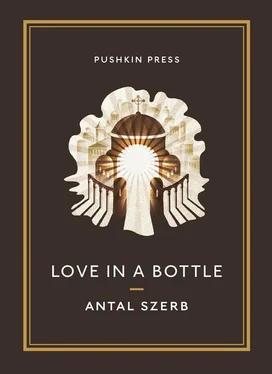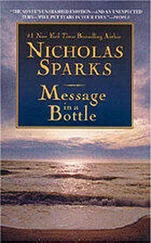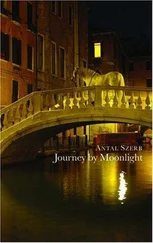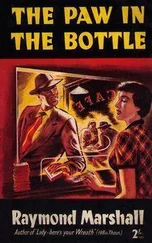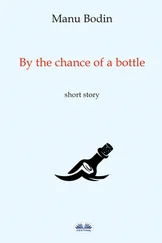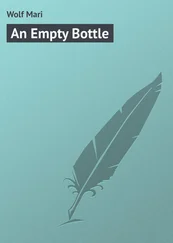Antal Szerb - Love in a Bottle
Здесь есть возможность читать онлайн «Antal Szerb - Love in a Bottle» весь текст электронной книги совершенно бесплатно (целиком полную версию без сокращений). В некоторых случаях можно слушать аудио, скачать через торрент в формате fb2 и присутствует краткое содержание. Год выпуска: 2013, Издательство: Pushkin Press, Жанр: Классическая проза, на английском языке. Описание произведения, (предисловие) а так же отзывы посетителей доступны на портале библиотеки ЛибКат.
- Название:Love in a Bottle
- Автор:
- Издательство:Pushkin Press
- Жанр:
- Год:2013
- ISBN:нет данных
- Рейтинг книги:5 / 5. Голосов: 1
-
Избранное:Добавить в избранное
- Отзывы:
-
Ваша оценка:
- 100
- 1
- 2
- 3
- 4
- 5
Love in a Bottle: краткое содержание, описание и аннотация
Предлагаем к чтению аннотацию, описание, краткое содержание или предисловие (зависит от того, что написал сам автор книги «Love in a Bottle»). Если вы не нашли необходимую информацию о книге — напишите в комментариях, мы постараемся отыскать её.
and
.
Love in a Bottle — читать онлайн бесплатно полную книгу (весь текст) целиком
Ниже представлен текст книги, разбитый по страницам. Система сохранения места последней прочитанной страницы, позволяет с удобством читать онлайн бесплатно книгу «Love in a Bottle», без необходимости каждый раз заново искать на чём Вы остановились. Поставьте закладку, и сможете в любой момент перейти на страницу, на которой закончили чтение.
Интервал:
Закладка:
“You are my husband: I shall follow you everywhere.”
“Ajándok, wonderful things do happen in this world. The wind racing by will sometimes turn and send a bunch of flowers spinning to the ground; hurricanes will crouch down and play among the corn stalks, like children. And,” he shouted, “I do believe that you are my betrothed, that you will stay with me for ever, and I shall never wander again.” He fell to his knees and kissed the hem of her dress.
“All my wanderings have been for your sake, Ajándok, my betrothed. Because of you I have carried the dust of the road of every land on my shoes. You are the clearing, the open glade in which I can rest at last. You are the long-lost palace to which I am now returning, the bed in which I shall finally sleep; the scarf that will seel my ever-watchful eyes; the little nest that will calm my beating wings; the golden chain that will fetter my flying feet. I have finally found what I have always been looking for, and now the mill will always be there for me, the mill and its sails!”
Ajándok could only listen in silence and let the kisses fall on her happy hand. She was in another world, where one drank the fragrant milk of moon-white cows.
Then the scholar drew himself up and said, almost fearfully: “I have one last journey to make, Ajándok, through the village. Thus it is written in my book. And then… I shall throw away the book and never travel again. Will you come with me on that one last journey, my betrothed?”
“Of course I shall.”
Hand in hand they raced down the little hill on which the mill stood, and into the village. From house to house, courtyard to courtyard, they ran in silence, nor did the dogs bark at them. Then the scholar began to exercise his miraculous craft. The moment he reached a farmyard he would lift up his book and begin to read (he could see the words even in the dark). In it was written the name of the owner, and what sort of man he was — according to which the scholar proceeded to reward or punish him. There was one who was envious and quarrelsome: the scholar blew behind the left ear of his cow, and from then on its calf would drink blood along with its milk, and in no time at all his entire young stock was destroyed. At the next place the owner was a good man, and there the scholar blew behind the cow’s right ear, and thereafter the milk would be rich, the calf it suckled would grow well, and the faces of his children would be ruddy with health. He also wrought justice by means of the pigs. The bad farmer’s pig had its tail twisted slightly, and no bacon or ham ever came from that pig, for by the autumn it was dead. If he made a baleful sign on a fruit tree, it would be impossible to rid it of caterpillars: the sign simply brought forth wave after wave of new ones. But where he left a favourable sign the tree would produce fine fruit, so lush you could hardly bear to sink your teeth into it. The bad farmer’s land he scattered with salt, and it became saline and produced nothing. Over the good man’s land he made a sign with his staff, whereupon the mice gave it a wide berth and hail never struck it. Thus he went from house to house, like a nocturnal bishop on his rounds.
Meanwhile, in the intimate language of plighted lovers, the two of them built up their plans for their future life together. The was no doubt in the scholar’s mind that the miller would grant him his daughter’s hand, and he took it for granted that he would be rich. He knew that out in the marshland there was a hidden treasure, guarded by black dogs. He was the only person who understood their tongue, and they would allow him access to it. They agreed that the house of Máté the scholar would be built directly opposite the mill. It would not be an ordinary house, but a tower with a flat roof, and on it the two of them would sit out, on evenings just like this, and smile as they talked about times past, when the scholar was still a vagrant wandering the highways and Ajándok was a young girl, playing with her dolls and too young for marriage. Their cows would have glass bells hanging from their necks; they would never have to shout at their servants — when summoned they would obey in perfect silence; Ajándok would walk on tiptoe round the bedroom, and the door wouldn’t squeak; when their saucepans banged together they would make music, and Mirók the kitten would sit in pride of place on a tower of cushions. Their front door would be forever open, and all sorts of vagrants would come and stay with them, but because of these visitors they would often not leave the house for weeks, and on Sundays they would do nothing but just sit there gazing at each other, and Ajándok would say: “See, here I am at home, the children are growing up, and when my beloved comes back they will be as tall as he is,” and Máté the scholar would add: “See, here I am at home. The country roads were bumpy and hard going, but now the earth has grown soft and rich, the highways are behind me, and I can rest.”
Thus, in a shared waking dream, they built their house of air: the vagrant looking to have a roof over his head and his betrothed, the child Ajándok; and both believed they really would live in it. Confidently they made their way through the sleeping village, and the scholar brought blushes from his bride’s cheek by talking of the little one they would one day have. His hair would be blond, like his mother’s. He would not come into the world, as his father had, with all his teeth full-grown: in fact he wouldn’t be like him at all, but calm and church-going, and the blessing of the holy water of baptism would shine on his brow for ever. The old ladies of the village would dandle him on their knees, and angels would sing to him. He would be truly beautiful, the king of all his little companions.
In the heart of the village, just outside the church, they stopped, Máté the scholar and Ajándok, to exchange tokens. Ajándok was still too young to own a beautiful embroidered scarf, so she simply gave him the ribbon she tied in the hair of Faraj her doll.
“But what can I give you, Ajándok? I had a veil, made of gossamer, which I once bought from a peddler who was two hundred years old, and other little knick-knacks too, but I used the gossamer to bind a wound, and I gave the knick-knacks away in one place or another on my way here, before I got to you, and now I have nothing to give my betrothed. Do you know what, Ajándok? I shall give you this book. You don’t yet know how to use it; I am the only one who knows how to do that. But… when I have a home, what need will I have of it then, and what will my loss of wisdom mean to anyone? I shall give it to you — when we get to the end of the village.”
The child waiting to be born rushed up to them, his tiny hands raised in the air. The cheerful babble filled their hearts with a feeling of benevolence, and they stood there, the pride and joy of the village.
But the night was waning, and they still had a way to go. Here and there the first faint colours were already dappling the white walls of the houses, and the air was chill.
They went on to within a stone’s throw of the end of the village. There they stopped outside a house with a fearsome reputation. The owner was a wicked man, drunk and boorish, the associate of thieves. Ajándok drew closer to her betrothed. She no longer felt anger now towards the malefactor because, in her dream, she knew her husband would take good care of her; and they now had a child, a beautiful child with large, beautiful eyes.
Then the scholar opened his book, and studied it for a long time. Slowly the colour drained from his face. He slumped against the sharp fence, beat his brow and looked distraught for what seemed an age, then he suddenly seized the terrified Ajándok by the shoulder and demanded: “Ajándok, what shall we call our child?”
Читать дальшеИнтервал:
Закладка:
Похожие книги на «Love in a Bottle»
Представляем Вашему вниманию похожие книги на «Love in a Bottle» списком для выбора. Мы отобрали схожую по названию и смыслу литературу в надежде предоставить читателям больше вариантов отыскать новые, интересные, ещё непрочитанные произведения.
Обсуждение, отзывы о книге «Love in a Bottle» и просто собственные мнения читателей. Оставьте ваши комментарии, напишите, что Вы думаете о произведении, его смысле или главных героях. Укажите что конкретно понравилось, а что нет, и почему Вы так считаете.
